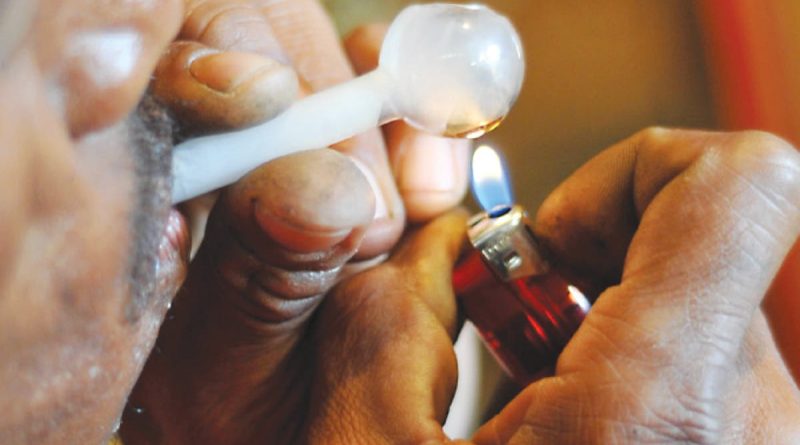Drug abuse costing Zimbabwe millions of dollars in lost productivity and poor social services
By Tendai Hove
GWERU: Munashe 25 (not his real name) is a drug addict.
He does not go to work and has been fired twice because he showed up high on drugs.
“If I spend a day without taking drugs I lose confidence in everything thing I do and I get angry and turn violent for no reason. I would rather spend my day in bed than waking up with no drugs. Drugs are my life they give me super powers,” he said.
He started by taking marijuana before graduating to more potent drugs such as crystal meth, commonly known as “gukka” to get a higher kick.
“My son Ethan (not his real name) was chased away from home by his father and he is now staying in the rural areas with his grandparents because he had resorted to stealing chickens that we keep for sale so that he can sell them to buy drugs,” said a parent of another drug abuser.
“He would spend the whole day acting like a wild animal if he does not take drugs. It is like he was a psychiatric patient because he would speak to himself but if he took drugs he will act normal.”
Drug trafficking has been on the increase and according to the Zimbabwe Civil Liberties and Drug Network 2019 report states that proportion of young people involved in drug substance use increased from 43% in 2017 to 57% in 2019.
The surge in drug trafficking is gobbling millions of dollars that Zimbabwe badly needs for social economic development and it causes low production in the country.
“Zimbabwe is fast becoming a destination of choice for drug smugglers. Drugs such as bronclear, cannabis and crystal meth whose prevalence is being driven by syndicates that involve locals and business men,” the police say.
According to a report by the Interpol’s National Central Bureau (NCB) in Zimbabwe, drugs syndicates use Zimbabwe as a transit country especially for cocaine and cannabis bound for foreign markets. Recent evidence indicates that Zimbabwe itself has a growing consumer market for these drugs too.
The United Nations estimates that the global trade in illicit drugs is worth $400 billion a year, and it accounts for eight percent of all international trade.
The police spokesperson Assistant Commissioner Paul Nyathi noted that, “the number of people arrested in connection to drug trafficking across the country has reached 8 000 in six months. Estimates on the value of seized drugs this year will be made public at the end of June.”
The Zimbabwe Police Report states that on 9 and 10 June 2023 at least 5 drug dealers were arrested in connection with unlawful possession of drugs ranging from a few grams to several kilos.
This affects the economy as drug traffickers evade taxes and are circulating illicit money through the economy. About USD2 772 000 in tax revenues is lost annually, monies which could have been channelled into infrastructure development, help procure more medicines in the local hospitals and clinics in the country, provide proper sanitation to avoid diseases such as cholera that are on the rise.
A United Nations Office on Drugs and crime report 2017, said drug abuse occurs mostly frequently among young people in the 15-35 age group with a particular concentration in the 18-25 age group, those who are in or are just about to enter work.
Consumption of illicit drugs lowers the chance of entering or remaining in the workforce, while frustration caused by failure to find adequate employment favors drug consumption, a vicious circle.
The cost of treating drug related mental health issues is mounting. The 2022 Zimbabwe Mental Health statement report revealed that the cost of mental health conditions to the economy was US$163.6 million in 2021.
In a speech delivered at the inaugural Development Conference towards a drug-free nation for the attainment of Vision 2030 in April this year, President Emmerson Mnangagwa noted that the government has availed US$500 million towards fighting drug abuse.
“It is my expectation that the $500 million availed by my government under the drug and substance abuse will accelerate high-impact activities and result in this fight to end drug abuse,” he said.
The president said that there is need to mitigate the harm associated with substance abuse as well as negative health and psycho-social fects through the provision of holistic treatment services for affected individuals.
Drugs do not only affect the economic status of the country but also the social and mental being of the people who abuse drugs. According to the Health Professionals Trust of Zimbabwe, 80 percent of jail inmates in mental institutions have drug and substance abuse induced psychosis. The most affected generation are the youths and the young adults who should be contributing to the growth of the economy.
The substances that are mostly used in Zimbabwe alcohol, cannabis, heroin, glue and cough mixtures. Historical usage of US dollars in Zimbabwe provides South Drug traffickers with an opportunity to exchange drug proceeds in South African Rand into US dollars for further laundering in Zimbabwe or in nearby countries. There are no universally accepted figures on illicit drug production.
“This story was produced by Tendai Hove. It was written as part of Wealth of Nations, a media skills development programme run by the Thomson Reuters Foundation. More information at www.wealth-of-nations.org.The content is the sole responsibility of the author and the publisher”




